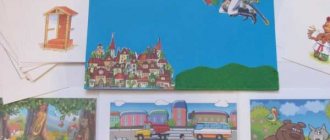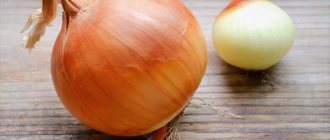Finger gymnastics
Cabbage We chop and chop cabbage, We salt and salt cabbage, We three and three cabbage, We press and press cabbage. (Imitation of movements.)
How many beds are there in the garden? In Fedora's garden there are tomatoes growing in the beds, and in Filat's garden there are a lot of different lettuces. Grandma Fyokla has four beds of beets. Uncle Boris has a lot of radishes. Masha and Antoshka have two rows of potatoes. Alternately bend your fingers for every two lines of text.
“Harvest” Glad, two, three, four, five - Alternately, clap your palms, then your fists. Let’s help you collect the harvest. Repeat the exercise after me. Bend your fingers for each name of the vegetable. In it, the sound T came to the garden bed. Here's a pumpkin, and here's a tomato. Here is cabbage, here is lettuce, caraway seeds, potatoes, artichokes and parsley roots. Everything that we have grown, We alternately clap our palms and then our fists. We will eat until spring.
Logorhythmic exercises (coordination of speech and movement)
Potatoes We dug up potatoes, picked cucumbers from the ridge, pulled out all the carrots, deftly cut the cabbage and brought it to you as a gift in a basket from the ground. (Squats, bends, imitation movements.)
Vegetable Garden Repeat the exercise after me (Step in place.) We came to our garden bed. Here's a pumpkin, and here's a tomato. (Extend your arms to the left, to the right.) Here is cabbage, here is lettuce. (Bend over to your left leg, then to your right.) Cumin, potatoes, artichoke (Straighten up. Hands on your waist, to your shoulders, up.) And parsley root. (Lower your hands.) Everything that we have grown, (Spread your arms to the sides.) We will eat until spring. (Hands down, straighten up.)
Source
Games and exercises
Game “Greedy” (children 4-8 years old) Add the word “my”, “mine”, “mine” to the name of each vegetable (my carrots, my cucumber)
Game “One - Many” (children 4-8 years old) . Up to 5 years, the version of the game is shortened (without a lot of words). Tomato - tomatoes - a lot of tomatoes potatoes - potatoes - a lot of potatoes (potatoes) eggplant - eggplants - a lot of eggplants pepper - peppers - a lot of peppers zucchini - zucchini - a lot of zucchini pumpkin - pumpkins - a lot of pumpkins carrots - carrots - a lot of carrots beets - beets - a lot beets (beets - meaning “many pieces”) onion (bulb) - onion (bulbs) - a lot of onions (bulbs) turnip - turnips - a lot of turnips radish - radishes - a lot of radishes (radish - meaning "many pieces") garlic - garlic - a lot of garlic (many heads of garlic) parsley - parsley - a lot of parsley cucumber - cucumbers - a lot of cucumbers pepper - peppers - a lot of peppers (meaning “many pieces”) head of cabbage - heads of cabbage - many heads of cabbage pea - peas - many peas pod - pods - a lot of pods
Exercise “Name it affectionately” (for children over 4 years old) Cucumber - cucumber - cucumbers tomato - tomato - tomatoes potatoes - potatoes - potatoes eggplant - eggplant - eggplants pepper - pepper - peppers pumpkin - pumpkin (pumpkin) - pumpkins radish - radish - radishes carrots - carrots (carrots) - carrots beets - beets (beets) - beets onions (bulbs) - onions (onions) - turnip bulbs - turnips (turnips) - turnips garlic - garlic - garlic parsley - parsley - parsley dill - dill - dill cabbage - cabbage - cabbage beans - beans - beans
Game “Say the other way around” (children from 6 years old) A good garden bed - ……. bad bed Old potatoes - ...... new potatoes Heavy bag - ...... light bag Large harvest - ………. small harvest Clean carrot - ……… dirty carrot Ripe tomato - ...... unripe tomato
Exercise “Complete the sentence” (children from 5 years old) The tomato is round, and the carrots. (oblong). The tomato is red and the carrots. The tomato is soft and the carrots... The tomato is sour, and the carrots. A tomato has a seed inside, and a carrot has a seed inside. The tomato grows on the ground, and the carrots. (in the ground).
Game “Names of juices” (children from 5 years old) Cucumber juice - cucumber juice Beet juice - beet juice Onion juice - onion juice Tomato juice - tomato juice Cabbage juice - cabbage juice Pumpkin juice - pumpkin juice Carrot juice - carrot juice
Preview:
Summary of GCD in the preparatory school speech therapy group ONR on the lexico-grammatical structure of speech
Topic: “Garden”.
- consolidation of previously acquired knowledge (fruits, vegetables, colors, geometric shapes, taste);
- introduce new concepts of garden and vegetable garden;
- development of mental operations in children (analysis, synthesis, generalization and comparison);
- expansion of active and passive vocabulary on the topic: “Vegetables”, “Fruits”;
- instilling confidence and discipline.
- Learn to form the diminutive form of a noun.
- Develop coordination of speech with movement, fine motor skills.
- Develop coherent speech, visual attention, and thinking.
- Rubber fruits, vegetables;
- 2 baskets + towels;
- Massage ball;
- TV+laptop for showing games;
- Sheets with images of silhouettes of vegetables and fruits.
1. Psychological attitude.
Speech therapist: As usual, at the beginning of the lesson, I tell you: “Hello!”
(Children also say hello).
I close my eyes and count to 3.
After I count to three and open my eyes, you must show what mood you are in.
Hello guys. You recognized me? I brought you autumn gifts.
L.: Thank you, autumn. Stay with us and watch how our children play.
2. Consolidation of the material covered.
Look what is in this basket (vegetables are examined and named); with the first correct answer, the vegetable is placed on the child’s table.
Guys, what other vegetables do you know?
What's in this basket?
Let's name them.
Guys, what other fruits do you know?
Fruits are also distributed to children.
How can you call in one word what I brought (vegetables), (fruits).
Children give answers.
3. Introduction of new concepts “garden” and “vegetable garden”
To find out what our activity is called today, we must answer the questions “Where do vegetables and fruits grow?” and then we will find out the topic of our lesson.
Where do you think Autumn got so many vegetables? (children's answers).
A vegetable garden is a fenced piece of land with beds and greenhouses. People grow vegetables there (show).
Well done, who can name the vegetables we pick? (cucumbers, tomatoes, peppers, etc.).
Which ones do we dig up? (potato).
And which ones do we pull out of the ground? (carrots, beets, radishes, turnips, onions, etc.).
What vegetables do we cut with a knife? (pumpkin, zucchini, cabbage, eggplant).
Okay, where did she pick the fruit? (Children's answers).
A garden is a fenced area with fruit trees - an apple tree, a peach tree, etc. (show).
Who can determine the topic of our lesson today?
4. Didactic game “What is what?”
Let's try to say what kind of juice we can get from vegetables and fruits?
The juice from an apple is apple, from a banana -..., from an apricot -..., from an orange -..., from a pear - pear, from a plum - plum.
Did you know that juice can also be made from vegetables?
Remember what the juice from carrots is called - carrot, and from a tomato - tomato.
What kind of jam will come out of it?



